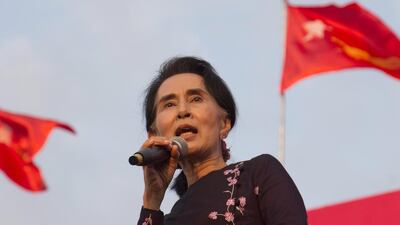Who could stay silent in the face of the atrocities being afflicted upon the Rohingya in western Myanmar? Not the Nobel laureate Malala Yousafzai, who said that her "heart breaks" at news of their suffering. Not regional leaders whose countries have been affected by the forced migration of the thousands of Rohingya fleeing persecution (more than 150,000 since last October alone). "The dire situation facing our Rohingya brothers and sisters must be alleviated," tweeted Malaysia's prime minister, Najib Tun Razak, while Indonesia's president, Jokowi Widodo, called for action.
Turkey's president, Recep Tayipp Erdogan, could not hold his tongue, declaring that "those who close their eyes to this genocide perpetuated under the cover of democracy are its collaborators." The UK'S foreign secretary, Boris Johnson, said that the treatment of the Rohingya was "besmirching the reputation" of Myanmar; and the UN secretary-general, Antonio Guterres, warned of a "humanitarian catastrophe".
But there is one person who has managed to keep her lips sealed, and who has appeared to be unmoved by the successive inhumanities visited upon the Rohingya - Myanmar’s de facto leader, Aung San Suu Kyi. Her seeming acquiescence in their tragedy has baffled and disturbed many. This was, after all, one of the greatest human rights icons of our time, a woman who was denied her freedom for so many years by Myanmar's former military junta, a regime that had at least once tried to kill her, and which had forced her to choose between her country and her dying English husband (if she had left to nurse him in the UK, she feared she would not be allowed back in again). It surely could not be that "the lady" didn't care or even that she approved?
The signs were actually there all along, such as her insistence that the Rohingya not be referred to by their name, as it was an “emotive term” - effectively denying them their identity in the land where they have lived for generations. Did Ms Suu Kyi in fact regard them as pestilential immigrants who were correctly denied citizenship?
_______________
Read more from Opinion
Permanent resettlement is the only way to resolve the refugee crisis
Peace in Myanmar can only prevail through recognition of identity
_______________
For a long time no one wanted to believe that. The army controlled the three relevant ministries (home affairs, defence and border affairs), her supporters pointed out, and constitutionally she had no power to overrule the generals, who still have the power to declare a state of emergency. Of course Ms Suu Kyi sympathised, went another argument, but it would be political suicide for her to speak out or attempt to intervene; alas, it appeared that the vast majority of Myanmar Buddhists were infected by an Islamophobia so virulent that her electoral support would vanish if she so much as criticised the ethnic cleansing being perpetrated on her own doorstep. She was now a politician, was a third; she shouldn't be held to the standards of an icon.
However, after recent statements from her office, it really is time to stop making excuses for Ms Suu Kyi. Accusing the Rohingya of burning their own homes, her office also said that international aid workers had been working with "Bengali extremist terrorists". Let no one imagine that there is an inch of daylight between the controlling and imperious Ms Suu Kyi and her state counsellor's office. This is a woman so "reluctant to delegate", as a recent profile in The Times put it, that she even insists on personally correcting the grammar in correspondence with foreign governments.
If her office regards Rohingya as "Bengalis" – a highly derogatory denomination that denies them any right to be in Myanmar – who have been perpetrating attacks on their communities for publicity, we can be sure that that is her view too. And if that is the case, then not only is there no point in appealing to Ms Suu Kyi's better nature – for clearly in this case it is entirely absent; it is also time to call for the Nobel Peace prize she was awarded in 1991 to be withdrawn, as she disgraces the institution by continuing to be known as a laureate.
It may be that the Nobel committee has never taken such a decision before. But that is no reason why it should not. As the New York Times’s “ethicist” columnist once put it, discussing taking back Nobel Peace prizes: “To retain the egregiously unworthy on this numinous list and thus to continue to proclaim their merit is to repeat a kind of lie.”
Short of outside intervention, it is difficult to know what measures could pressure the Myanmar authorities to discontinue their campaign of ethnic cleansing, rape and destruction, and their creation of an entirely unnecessary migrant crisis that affects Bangladesh in particular but the entire region as well.
Aung San Suu Kyi facing the ignominy of being the first Nobel laureate to have the award taken away could be one. The return of sanctions could be another. For if their removal was a reward for good behaviour – reforms and democratisation – why should they not be reimposed when crimes equal to any unleashed by the junta are taking place under the leadership of Aung San Suu Kyi? That she was hitherto regarded as a secular saint makes it all the more sickening. Yes, Ms Suu Kyi is now a politician – and one the world must hold to account before any more of her countrymen are killed, tortured and dispossessed by her own armed forces.
Sholto Byrnes is a senior fellow at the Institute of Strategic and International Studies Malaysia
Follow The National's Opinion section on Twitter
________________
More from on Myanmar's Rohingya Muslims


